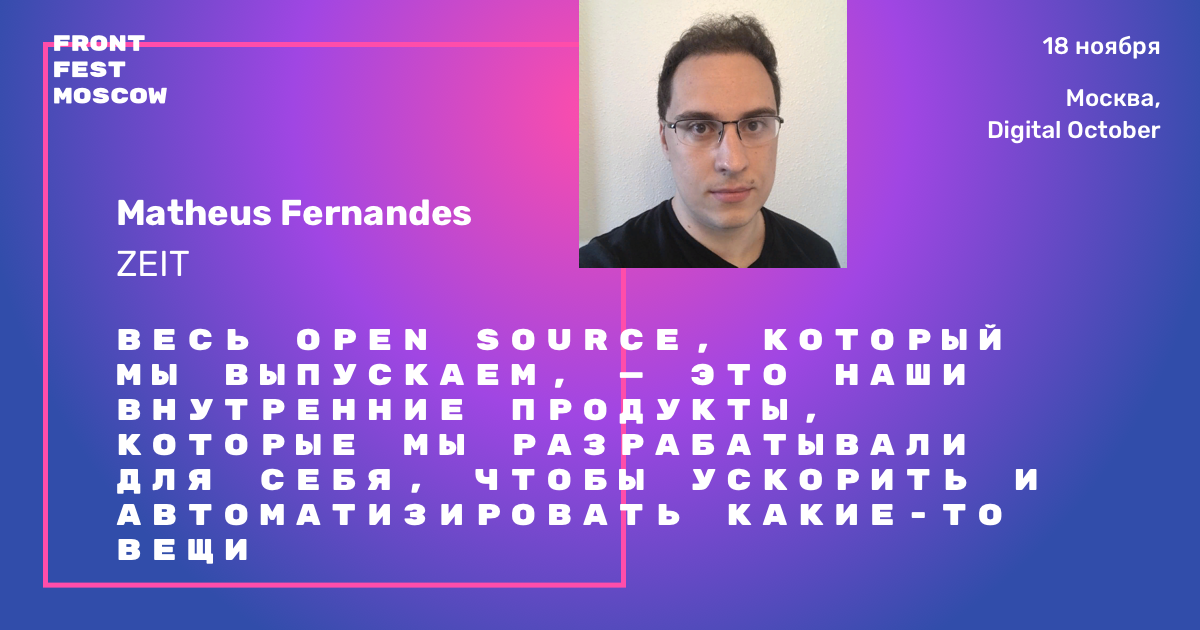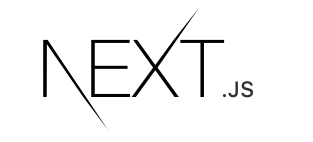Mateus Fernandez, ZEIT - in IT without education. FrontFest.Keynote

Mateus Fernandez is 22 years old and he is vice president of technology at ZEIT. Before that, he did not work anywhere, he left the university, wrote Kap .
We asked our film-speaker about Russia, its path from the student to the vice-president and why Next.js does not expect the fate of Meteor.js.
- Have you been to Russia before? Not afraid to go?
- It will be the first time. Not scary at all, but very curious how it will be. I know that this is a country of different cultures and I wonder how all this fits together with you.
')
- Do you know anything about IT in Russia? Your team seems to have Russian.
- Igor, yes. Great guy. But besides his pkg project, I don’t know any software from Russia ...
- Maybe some Russian companies?
- ... as, in general, and companies.
- Tell me, how did you get to ZEIT?
- Last year, ZEIT announced Hyper, a terminal emulator made in HTML / CSS / JavaScript. I started to use it and I liked that you can make extensions for it just by writing a small js-file.
I was looking for information about who did it. It turned out that the team has Guillermo Rauch. And he worked on Mongoose and socket.io - I used all this. I understood what kind of company it is if the creators of such libraries work there. Since then, I have become actively involved in the life of the Hyper community. At some point I got access to the repository, wrote a package manager for Hyper, making the work with dependencies as easy as in npm - hpm .
In the end, I decided to write to ZEIT and send my crafts - I wrote, something like: “Hello! I do not have a portfolio, I have not worked anywhere, and recently dropped out of college because I hate it. But I really want to do important and interesting things. I have nothing to show, except for the hyper package manager, which I wrote in a few hours and approximately 100 lines of code, but I really love the web, JavaScript, and I don't even care what position you take me to, the main thing is to work with you. ”
- And everything turned out?
- I waited and continued to communicate in the community Next.js, talked in the Zeit chat - there I was offered to write an application to record video from the Mac screen. I agreed. Kap quickly spread over the network, many downloads, many posts on social networks, thousands of stars on github.
“I think no one read my letter.” When I was taken to work, I learned that we have 300-400 of such proposals, which are just waiting at the post office.
I returned to Slack, talked about this, and after three or four weeks, ZEIT wrote to me, offered a test task: to make Hyper work on Windows. I did and now I'm on the team! I will tell you more about this path in the report .
- Can you share some funny stories from work?
- I don’t know about the work, but somehow I had to speak at ZEIT Day - this is our conference - and to represent Now . We wanted to show that Now can slow down in 30 seconds. And here I am standing on the stage. I enter now, I enter my domain, but I don’t notice how I make a mistake in some word and nothing works. I say out loud “oh, shit”. Erasing, writing again. And again I make a mistake. I swear again and write everything again and am mistaken for the third time. This very moment in my work was the most unseemly.
- What are you responsible for in the company?
- My post is called VP of Engineering. But we are a startup. Therefore, sometimes I analyze how much money we have spent on the database, tinkering with answers, buying tickets if the team is flying somewhere. But in general, my role is to distribute tasks between people. Wondering how things are going, how you can help. I keep all the chains in sync, analyze the mood in the team and motivate.
- Another area of responsibility is to monitor how we deliver the product and how fast it works. Now must deploy quickly, no one wants to wait the extra seconds.
- If you have so much open source, then what do you earn?
- Suppose you have a static website: index.html, style.css, and picture.jpg. You want to put it all down. You open your terminal, go to the folder with the site, enter now and within three seconds your site is already hosted. Moreover, with everything you need - TLS, HTTPS, and other things. We host applications on node.js, working with Docker. On this and earn.
- Suppose, I think, on what to make a JS application and I need to have an SSR out of the box. Why choose Next.js instead of Angular.js?
- In the PHP world, everything is very simple - you write index.php, you start the server and everything works. You do not need to think about babel, you do not need to use Webpack, to think about how to enable routing. Next.js makes JavaScript of such PHP. And helps to make sites quickly. You need to install Next.js and React (because it is a dependency of Next.js). Then you create index.js, which exports JSX and enters in the terminal Next. All - you have index.html with everything you need. And no need to think about any settings.

- From the outside, it seems that Next.js is similar to Meteor.js - you don’t need to do anything, everything is already set up. Not afraid that he will die because of this, just like Meteor.js?
- We are not afraid at all. We have a very strong community, regular releases. Unlike Meteor, there is no hard link to MongoDB, as it was in Meteor. Plus, Next.js is very light. All the open source that we release is our internal products, which we developed for ourselves in order to speed up and automate some things.
- Share any Next.js chips?
- There is one thing that people, for reasons unknown to me, do not use very often - dynamic import. With dynamic import you can not give to the client components that may not be needed. For example, what is available only after authorization. The client does not have to pull all this code. Such components themselves when they are needed. So, the size of the bundle will be less, and the download speed of the site will be higher.
- What is the future of the web?
- As for JavaScript, everything will move towards greater nativeness. And WebAssemblly will help with this. I don’t think that everyone will start using WA, but those who are interested in performance are sure to start accessing the web more often.
- What report at FrontFest would be interesting for you to visit?
- “The history of a single performance metric on Booking.com” Metrics are interesting. And in general, I love Booking. Another “A developer's guide to accessibility APIs” is also, of course. I would really like the developers to consider the importance of the availability of sites. I am sure that often there are problems with accessibility, not because no one wants to do this, but because it is not always an easy task.

FrontFest will delight speakers with a unique experience. Punch Matheus will close the conference and Blaine Cook , the creator of OAuth, will open it.
Sign up, 11 days left.
Read more:
- Front-end life in Spotify
- Apartment attendants at the conference
- Workshops: cross-platform applications on Angular, 3D games on Canvas and backends on Node.js
- Sections: JAVASCRIPT , VYORSTKA and MIX
Source: https://habr.com/ru/post/341892/
All Articles